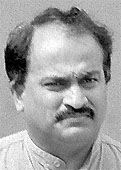

|
Strip! You’re a common
prisoner,
Mr Minister
Express - April 16, 2001
By Raffique Shah
RAFFIQUE SHAH, along with three other army officers and 80-plus soldiers, spent some 27 months in prison as they faced charges of treason and mutiny. During that period, Shah studied the manner in which prisoners were treated. Here he looks at the plight of ex-local government minister Dhanraj Singh and attorney Jagdeo Singh.
THE first feeling of panic comes when you enter the prison compound. Nothing you have learnt or done in life prepares you for the sound of the main entrance gates—there are usually two, between which the vehicle transporting you to jail must pause—are opened by a grim-looking prison officer.
The jangling of the biggest bunch of keys you’d ever see, not to add the sizes of the keys themselves, and the clanging of steel against steel as the huge, seemingly impregnable gates are slammed shut behind you, cause your saliva to immediately dry up and your heart to race.
Now you know you are in jail. You, who, up until recently, lived in the upper echelons of society and strutted in the corridors of power like ex-minister of local government Dhanraj Singh, find yourself powerless, even helpless. Or in the case of attorney Jagdeo Singh, he will have visited such institutions complete with jacket-and-tie, and was escorted to interview clients in the room designated for such purpose.
Now, in both cases—and those of other high-profiled prisoners—you are nothing but another prisoner, albeit not yet convicted, which, as I shall explain, puts you in a position worse than convicts.
Because of the nature of society in general, and more specifically, the inequality of societies like ours, people at a certain level hardly ever see the insides of police stations, far less prisons. If they do commit crimes, mostly they are “white collar” infractions that are dealt with “internally”, and they hardly reach the courts (if they did, hundreds of bank employees would be incarcerated!).
Further, if such people are actually charged with committing crimes, whether it’s murder or stealing, they tend to be given preferential treatment while they are in prison. The authorities deny this, of course. But they will never explain why some high-profiled prisoner is in the Infirmary and not in a stinking cell, especially when the prisoner seems to be in good health.
 
DHANRAJ SINGH JAGDEO SINGH
Jail, however, is jail. It matters not if you carry enough clout to buy yourself a bed in the Infirmary or you are left to rot in a cell with hordes of other vicious (or vicious-looking) prisoners, the bottom line is you are in prison.
The process that begins immediately after you enter the gates spell out the grim reality that you have lost almost all of your rights. You are dehumanised from the moment you are “checked in”.
In the two instant cases I am writing about, the Singhs will have had to fall in line with assorted thieves, rapists, bandits and petty criminals in the “reception” area. Do not ever let the name “reception” mislead you into thinking you are in some hotel!
Because the first order from one of the officers on duty there is shouted loudly: “Strip!” You look around you nervously—after all, you are in an open corridor and there are other prisoners all around you. So you hesitate even as you watch the “regulars” peel off their clothing and casually slip off their underwear, standing stark naked.
“Wha happen? Yuh ’ent hear mih say strip?” the officer howls. So you slowly remove shirt, pants, shoes, socks...but not the jockey shorts. “Take off yuh shorts!” the officer screams into your ear, and the seasoned criminals around you snigger.
So your last line of defence, your manhood, is taken away and you stand naked in the line as others watch you, from head to foot, back to front. This is why jail is jail: the dehumanisation process begins upon entry, and it continues for the duration of your imprisonment.
You hand in your valuables and they are placed in bags that are tagged. The body-search that follows depends on the officer you encounter. If he sets out to humiliate you (I’ve seen that done to prisoners), he would insist that you squat and peep up your backside, at times shining a torchlight there, for his “kicks” and for the amusement of prisoners and fellow officers.
For prisoners like the two Singhs, who will have lived sheltered lives up until they landed on the wrong side of the law, the “reception” areas will have been an eye-opener of horrendous proportions.
You see, when we were imprisoned, we were soldiers who had grown accustomed to undressing in the presence of other soldiers, and in any event, not one of the accused soldiers in 1970 was subjected to such humiliation. But I saw a postal employee who had gone to college with me, and who was convicted of mail fraud, break down in tears when he went through the “reception” that was anything but a reception!
That part of the entry procedure, however, pales when the time comes for you to be placed in a cell. I imagine that both Singhs are in individual cells, which is really preferential treatment. Other prisoners who are there on lesser counts have to endure the trauma of being stuffed into overcrowded cells where the strongest get to lie down and sleep (on faeces-caked, cold concrete) while the weaker ones sleep sitting or standing.
But that is of minimal importance in another way. When you are escorted into a single cell and the officer slams the door behind you, then proceeds to turn the key several times (hence the term “turnkey”), reality hits you square between the eyes.
You look at the four walls that surround you (I haven’t been to the new Maximum Security Jail where, I understand, the cells are self-contained, in that they are equipped with individual toilets) and your mind races. How, pray God, did I end up here? And when am I going to be released?
You always convince yourself that it would be a short stint, and your attorneys underscore that: they are forever “working hard” to get you bail or an early trial. The first 24 hours are the worst. You think of your family, of your friends (many of whom will now desert you), feel sorry for yourself, and if you are not strong enough, you cry.
But your ordeal has only just begun. If you are in the old prisons, you are supplied with a “posy” (chamber pot) and an enamel cup. In the new jail, I guess the toilet has replaced the “posy”. Still, doing your “numbers” falls well within the basic ideology of all prisons, which is to reduce the prisoner to being less than human.
So when you are urinating, an officer has the authority to stand and watch you. And yes, when you are defecating, the toilets are so positioned that officers can peep into the half-door cubicles and monitor you. The “regulars” take it all in stride. But for prisoners like the Singhs, they must have remained constipated for days!
Just how do you adjust from posh toilets at your well-appointed homes to this violation of your most private functions is traumatic in the extreme.
The other aspect of prison life that hits the “big shot” prisoner hard, especially someone like Dhanraj who was a minister accustomed to barking orders behind lesser mortals, is the restrictions you face.
Breakfast (well, they call it that) is served by 8 a.m. Lunch-and if you eat prison “ration”, which the Singhs may not have to do, follows at 11 a.m., and dinner around 3 p.m. And everything you must have heard about prison food is true.
The cocoa (tea, they call it) is brackish and has a muddy appearance, the bread is akin to unleavened flour, the soup is an amalgam of ingredients cooked separately and then put into one huge cauldron, and everything is contaminated with weevils, parts of cockroaches and other extraneous matter.
If the meals are bad, holidays are worse for prisoners. On normal days, you are allowed at least one hour outside your cell. But on holidays, with most staff being off duty, you’d hardly be allowed outside since there aren’t enough officers to supervise prisoners.
So this Easter weekend, for example, while people flock the beaches and holiday resorts, Dhanraj and Jagdeo will be stewing in their cells. Which brings me to another point; these cells, with very little ventilation, become ovens on hot days. Based on the heatwave we’ve experienced since January, prisoners must be barbecued in their cells.
I need add that besides the initial body search, a prisoner can be subjected to the same treatment anytime an officer chooses to conduct the exercise. During bouts of insomnia, you long to be close to those you love, and that’s when the loneliness of prison life hits you hardest.
It was not surprising, therefore, that Fuad Khan reported that Dhanraj cried for the entire duration of a visit he (Khan) had with his one-time colleague. You feel bitter if you know people who were once your friends or colleagues have not only thrown you to the wolves, but they refuse to associate themselves with you.
When, sometime in 1996, Dhanraj was arrested by Senior Supt Norton Registe, Sports Minister Manohar Ramsaran was at his side in a flash, and turned up at the Chaguanas court in his slippers to lend support to his friend. Now, it seems as if an order has been passed in the Cabinet: no one must visit Dhanraj.
I know when we were imprisoned, our fellow officers and soldiers who dared to show sympathy with us were dealt with harshly. Maybe Dhanraj is in a similar bind.
And really, the reality of prison only hits you when you hear the command: “Strip!”
Previous Page
Copyright © Raffique Shah
|